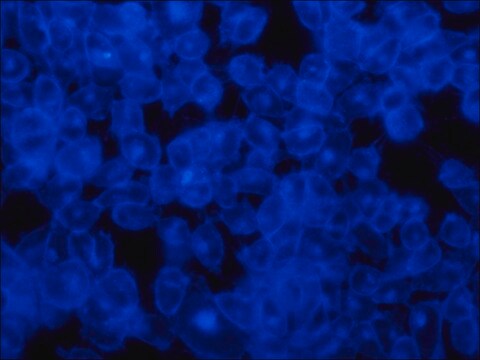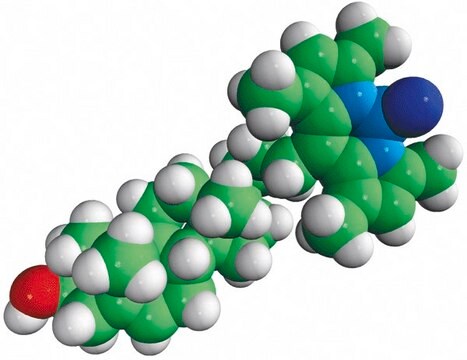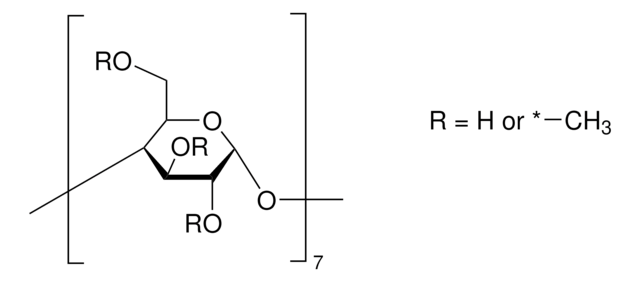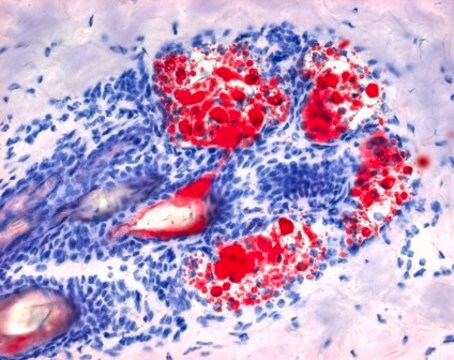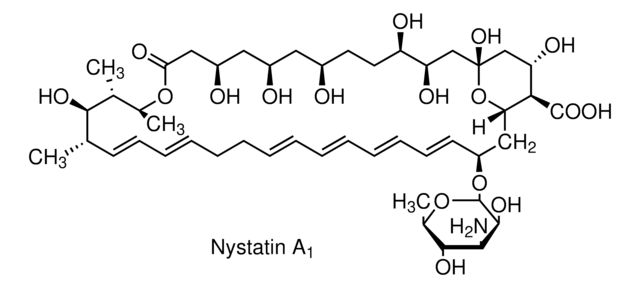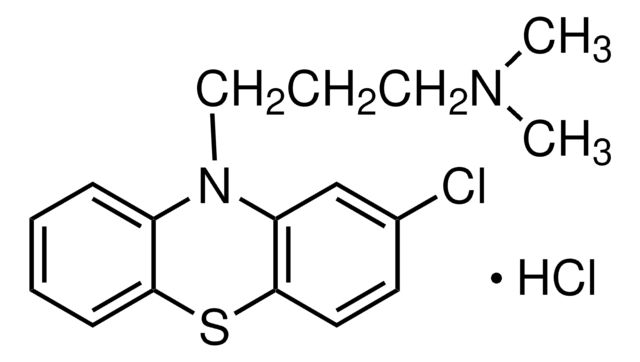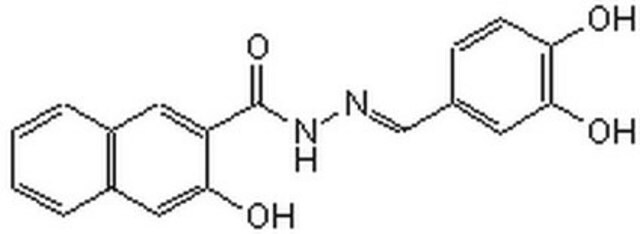SAE0087
Filipin III ready made solution
from Streptomyces filipinensis, 1mg/ml in DMSO based solution
Synonym(s):
Filipin III solution
Sign Into View Organizational & Contract Pricing
All Photos(1)
About This Item
UNSPSC Code:
12352200
NACRES:
NA.77
Recommended Products
Quality Level
Assay
≥95% (HPLC)
form
ready-to-use solution
storage condition
protect from light
shipped in
dry ice
storage temp.
−20°C
Related Categories
General description
Filipin III is a polyene macrolide antibiotic and the major component isolated from cultures of S. filipinensis. 1 Due to its ability to fluoresce and bind to cholesterol, Filipin has been widely
used as a probe for sterol location in biological membranes 2 and has been used clinically as a stain for free cholesterol in the study of Type C Niemann-Pick disease. 3 Filipin inhibits prion protein (PrP) endocytosis and causes the release of PrP from the plasma membrane. 4 Filipin III was found to trigger signaling responses in tobacco cells, including a NADPH oxidase-dependent production. 5. The antifungal mechanism of action may be due to altering membrane permeability and associated functions by binding to membrane sterols. Filipin inhibits prion protein (PrP) endocytosis and causes the release of PrP from the plasma membrane.
used as a probe for sterol location in biological membranes 2 and has been used clinically as a stain for free cholesterol in the study of Type C Niemann-Pick disease. 3 Filipin inhibits prion protein (PrP) endocytosis and causes the release of PrP from the plasma membrane. 4 Filipin III was found to trigger signaling responses in tobacco cells, including a NADPH oxidase-dependent production. 5. The antifungal mechanism of action may be due to altering membrane permeability and associated functions by binding to membrane sterols. Filipin inhibits prion protein (PrP) endocytosis and causes the release of PrP from the plasma membrane.
Application
Filipin has been used in a double staining procedure as a probe for the detection of lipoproteins in polyacrylamide gel and immobilized on nitrocellulose membranes. It is also widely used to localize and quantitate unesterified cholesterol by virtue of a specific fluorescent complex.
Other Notes
- Filipin III solution is very sensitive to air and light. Upon receipt aliquot and store at -20°C avoid freeze thaw cycles.
- Filipin III is used in various concentrations depending on the specific protocol used. Dilute 1mg/ml stock solution with appropriate buffer according to the used protocol.
- Filipin III interaction with cholesterol alters the absorption and fluorescence spectra, for visualization with a fluorescence microscope use excitation at 340-380 nm and emission at 385-470 nm (Filipin fluorescent staining photo-bleaches very rapidly, thus the sample should be analyzed immediately).
Storage Class Code
10 - Combustible liquids
WGK
WGK 1
Flash Point(F)
188.6 °F
Flash Point(C)
87 °C
Choose from one of the most recent versions:
Already Own This Product?
Find documentation for the products that you have recently purchased in the Document Library.
Customers Also Viewed
Filipin, an Antifungal Antibiotic: Isolation and Properties
George B. Whitfield, Thomas D. Brock, Alfred Ammann, David Gottlieb, and Herbert E. Carter
Journal of Chemical and Pharmaceutical Sciences, 4799-4801 (1955)
Nina H Pipalia et al.
Journal of lipid research, 47(2), 284-301 (2005-11-17)
Niemann-Pick disease type C (NPC) is an autosomal recessive genetic disorder manifested by abnormal accumulation of unesterified cholesterol and other lipids. We screened combinatorially synthesized chemical libraries to identify compounds that would partially revert cholesterol accumulation. Cultured CHO cells with
Ruochen Zang et al.
Proceedings of the National Academy of Sciences of the United States of America, 117(50), 32105-32113 (2020-11-27)
Cholesterol 25-hydroxylase (CH25H) is an interferon (IFN)-stimulated gene that shows broad antiviral activities against a wide range of enveloped viruses. Here, using an IFN-stimulated gene screen against vesicular stomatitis virus (VSV)-SARS-CoV and VSV-SARS-CoV-2 chimeric viruses, we identified CH25H and its
M A Castanho et al.
The Journal of biological chemistry, 267(1), 204-209 (1992-01-05)
The alterations in the absorption and fluorescence spectra observed for the polyene antibiotics filipin and nystatin in the presence of cholesterol are due to an exciton interaction (polyene aggregates) and cannot be attributed to a specific sterol-antibiotic complex. Filipin and
Zhenfeng Wang et al.
Cellular & molecular immunology, 19(2), 210-221 (2022-01-06)
Exploring the cross-talk between the immune system and advanced biomaterials to treat SARS-CoV-2 infection is a promising strategy. Here, we show that ACE2-overexpressing A549 cell-derived microparticles (AO-MPs) are a potential therapeutic agent against SARS-CoV-2 infection. Intranasally administered AO-MPs dexterously navigate
Our team of scientists has experience in all areas of research including Life Science, Material Science, Chemical Synthesis, Chromatography, Analytical and many others.
Contact Technical Service

